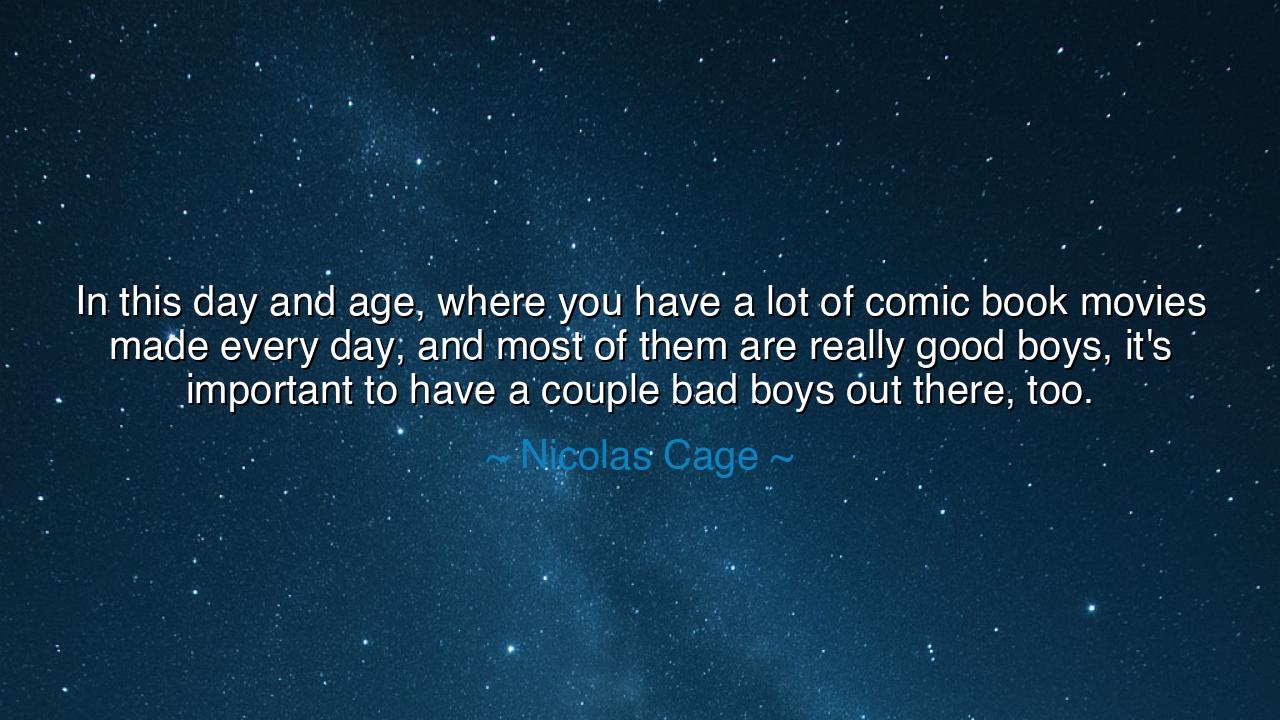
In this day and age, where you have a lot of comic book movies
In this day and age, where you have a lot of comic book movies made every day, and most of them are really good boys, it's important to have a couple bad boys out there, too.






When Nicolas Cage declared, “In this day and age, where you have a lot of comic book movies made every day, and most of them are really good boys, it’s important to have a couple bad boys out there, too,” he was not merely speaking of cinema — he was speaking of the eternal dance between order and chaos, virtue and rebellion, that defines both art and humanity itself. Beneath his playful tone lies a truth that echoes through every age: that greatness is not born from perfection alone, but from the boldness to break form, to disturb the comfortable, and to remind the world that beauty often hides in the wild and the untamed.
Cage’s words can be heard as a defense of the maverick spirit, that sacred flame within the artist that refuses to conform. The “good boys” he speaks of represent discipline, control, and the polished harmony of heroes who follow the rules — those who uphold ideals of courage, morality, and order. Yet even in the golden light of their virtue, the human soul yearns for the darker flame — for the “bad boys”, the tricksters, the outlaws, the antiheroes who remind us that imperfection, too, is part of truth. Without them, art becomes sterile, and storytelling loses its pulse.
In the great myths of old, this tension between the noble and the unruly has always existed. Prometheus, who defied the gods to bring fire to mankind, was a “bad boy” of Olympus — condemned for his defiance, yet revered for his gift. Loki, the mischievous god of Norse legend, brought both chaos and transformation to the world of order. Even Odysseus, cunning and flawed, triumphed not through purity, but through wit and rebellion against fate. So too does Cage remind us that the artist — like these mythic rebels — must sometimes break boundaries to reveal deeper truths. The world may love its heroes, but it needs its heretics just as much.
The origin of Cage’s quote arises from his own journey as an actor — a career defined by extremes. While many sought predictability, Cage pursued risk. He played not only the righteous or the romantic but the strange, the troubled, the raw. In an era where film franchises follow formulas and heroes fit into boxes, Cage became an emblem of creative freedom — a man who dared to be eccentric in an age of restraint. His statement is both self-reflection and challenge: that art must leave space for the unpredictable, for those who color outside the lines, lest it lose its soul.
Indeed, even the comic book world itself, which he references, thrives on this duality. For every shining Superman, there must be a tormented Batman; for every pure Captain America, a restless Wolverine. These figures endure because they mirror the truth of human nature — that goodness is not without shadow, and rebellion is not without purpose. Cage’s insight is that balance between light and dark is what keeps art — and humanity — alive. When the world becomes too clean, too sanitized, too polished, it forgets the power of imperfection to ignite imagination.
History offers many who embodied this principle. The painter Caravaggio, who lived wildly and fought violently, yet created works of divine light and shadow; the composer Beethoven, whose defiance of convention birthed symphonies that thundered with both rage and transcendence. These were not “good boys” of their time — they were dangerous dreamers, artists who bled for the truth of their visions. Their legacy, like Cage’s spirit, reminds us that the world needs those who disturb the still waters, who challenge beauty to evolve.
From his words, we draw a lesson both artistic and moral: do not fear the wildness within you. The world may reward conformity, but it is nourished by originality. In your craft, in your thinking, in your very being, dare to be more than acceptable — dare to be authentic. The “bad boy” that Cage praises is not one of cruelty or destruction, but of courage — the courage to stand apart, to question, to burn brightly even when misunderstood.
So, let this truth be passed on: the light needs its shadows to shine. The world may need its heroes, but it also needs its rebels, its dreamers, its Nicolas Cages — those who remind us that art, and life itself, is not about fitting perfectly into a mold, but about breaking it to reveal something new. For it is in the clash between chaos and order, between the good and the wild, that creation itself finds its heartbeat.






AAdministratorAdministrator
Welcome, honored guests. Please leave a comment, we will respond soon